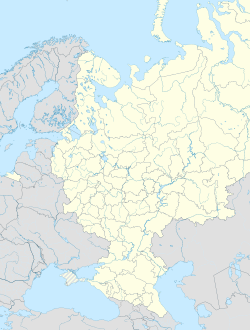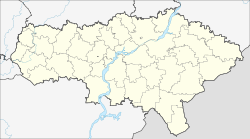Engels (city)
| city
Engels
Энгельс
|
||||||||||||||||||||||||||||||||||||||||||||
|
||||||||||||||||||||||||||||||||||||||||||||
|
||||||||||||||||||||||||||||||||||||||||||||
| List of cities in Russia | ||||||||||||||||||||||||||||||||||||||||||||
Engels ( Russian Э́нгельс ; until 1931 Pokrowsk / Покровск / German temporarily Cossack town ) is a city in Saratov Oblast in Russia . It has 202,419 inhabitants (as of October 14, 2010). From 1924 to 1941 the city was the administrative seat of the autonomous Volga German Republic .
geography
Engels is located on the banks of the Volga , directly opposite the larger city of Saratov . The city is the administrative seat of the eponymous Rajon Engels and the second largest city in Saratov Oblast. Engels is located in the European part of Russia , approx. 850 km southeast of Moscow .
The city has a Russian-Mediterranean flair, buildings from the 19th century shape the image of the city center. It is through the three-kilometer Saratov Bridge connected to Saratov. In the center is a large Friedrich Engels monument. A town a little further up the Volga is called Marx .
history
In 1747 the place Pokrovskaya Sloboda was settled and in 1914 it received city status and the name Pokrovsk. With the establishment of the Autonomous Socialist Soviet Republic of the Volga Germans in 1931, the city was renamed after Friedrich Engels . During the time of the Volga Germans, Engels was the capital of the commune of the same name, then of the Volga German Republic. Since 1931 there was a "German State Theater" in Engels with a capacity of around 800 seats, which was mainly supported by German amateur theater groups. From 1936 onwards, German emigrants such as Erwin Piscator and Bernhard Reich took on the theater, but in view of the Stalinist purges it was not granted any duration. In Engels there was a prisoner of war camp 368 for German prisoners of war of the Second World War .
On April 12, 1961, after the first manned space flight with the landing capsule of the spaceship Vostok 1 , Yuri Gagarin went down about 25 kilometers from Engels in the steppe near the village of Smelowka .
Population development
| year | Residents |
|---|---|
| 1939 | 73,240 |
| 1959 | 90.724 |
| 1970 | 130.066 |
| 1979 | 161,349 |
| 1989 | 181.201 |
| 2002 | 193.984 |
| 2010 | 202.419 |
| 2017 | 225,752 |
Note: census data
economy
Companies from the automotive industry are concentrated in Engels. There are manufacturers of trolleybuses (the Trolsa (Тролза) plant), railway wagons, special vehicles and transport machines in the city. The chemical industry, which used to dominate, has largely ceased operations.
Several German companies also have branches or production sites in Engels. The largest company in Engels is the OAO " Robert Bosch Saratow" company, which produces spark plugs , control units , cable harnesses and other things for the Russian automotive industry and the European market. The Henkel company produces washing powder and chemical products for the automotive industry in Engels.
military
The Russian armed forces operate several branches in the vicinity of Engels. This also includes the Engels-2 military airfield with attached barracks. After the restructuring, 14 heavy strategic nuclear long-range bombers of the type Tupolev Tu-160 of the long-distance air forces are stationed at the military airfield . The machines belong to the 121st Heavy Bombing Regiment (belonging to the 22nd Heavy Bombing Division) of the Russian Air Force . Since June 2008, the Tupolev Tu-95 MS and Tupolev Tu-22M 3 long-range bombers have also been flying patrol flights over the Arctic and the Atlantic from the base. For this purpose, the bombers are refueled by Ilyushin Il-78 tankers .
Further educational institutions
- Regional Center for Cadre Preparation of Moscow University for Consumer Cooperation
- Technological Institute of Saratov State Technical University
Attractions
- The building of the reading room of the Central Library, built in 1909
- Trinity Church (Троицкая) built in 1825
- Local museum
- Lew Kassil Museum
- Monument in honor of the Russian-German victims of repression in the USSR ( Russian : Российским немцам-жертвам репрессий в СССР), unveiled on August 26, 2011
sons and daughters of the town
- Herold Belger (1934–2015), writer and translator of Russian-German origin
- Konrad Hoffmann (1894–1977), Russian-German politician
- Lew Kassil (1905–1970), children's book author
- Igor Komarov (* 1964), politician, industrialist, financier and manager
- Gennadi Korban (* 1949), wrestler
- Askold Murow (1928–1996), composer
- Yuri Shargin (* 1960), cosmonaut
- Alfred Schnittke (1934–1998), composer and pianist of Russian-German descent
- Viktor Schnittke (1937–1994), Soviet-German poet, writer and translator
- Artyom Stolyarov (known as Arty , * 1989), trance DJ
- Wera Stramkouskaja (* 1958), human rights activist
- Alexandra Vorobyova (* 1989), singer
literature
- Peter Diezel: Theater in Soviet Exile. In: Persecution and exile of German-speaking theater artists . KG Saur, Munich 1999 (Handbook of the German-speaking Exile Theater 1933–1945. Vol. 1). Pp. 289-318.
- Hermann Haarmann, Lothar Schirmer , Dagmar Walach: The “Engels” project. An anti-fascist theater of German emigrants in the Soviet Union (1936–1941) . Heintz, Worms 1975.
- Bernhard Reich: In a race against time. Memories from five decades of German theater history . Henschel, Berlin 1970.
Web links
Individual evidence
- ↑ a b Itogi Vserossijskoj perepisi naselenija 2010 goda. Tom 1. Čislennostʹ i razmeščenie naselenija (Results of the All-Russian Census 2010. Volume 1. Number and distribution of the population). Tables 5 , pp. 12-209; 11 , pp. 312–979 (download from the website of the Federal Service for State Statistics of the Russian Federation)
- ^ Peter Diezel: German State Theater Engels. Erwin Piscator, Maxim Vallentin and the defamation of German emigrants as "bourgeois nationalists". In: Karl Eimermacher, Astrid Volpert (Ed.): Stormy departures and disappointed hopes. Russians and Germans in the interwar period . Paderborn: Fink 2006. pp. 987-1020. - Peter Diezel: Interface Moscow . Berlin: Edition Schwarzdruck 2008. pp. 26–35.
- ↑ Maschke, Erich (ed.): On the history of the German prisoners of war of the Second World War. Verlag Ernst and Werner Gieseking, Bielefeld 1962–1977.
- ↑ Report on the unveiling of the monument ( page no longer available , search in web archives ) Info: The link was automatically marked as defective. Please check the link according to the instructions and then remove this notice. on nversia.ru, accessed September 1, 2011






